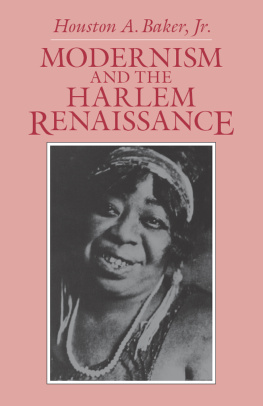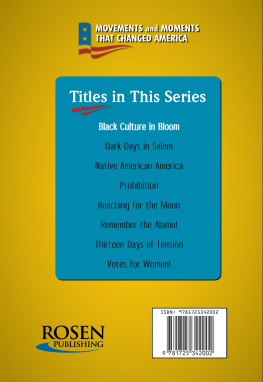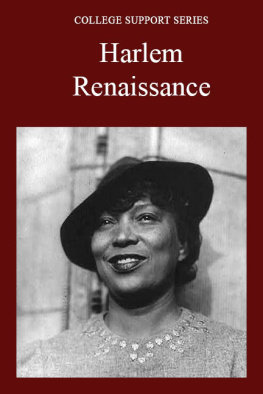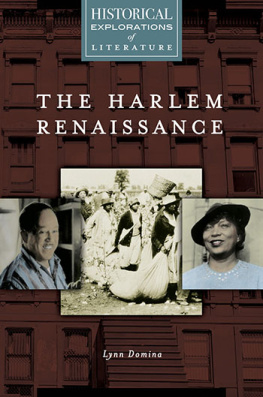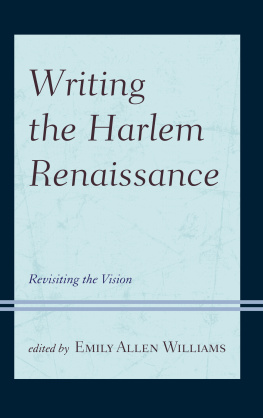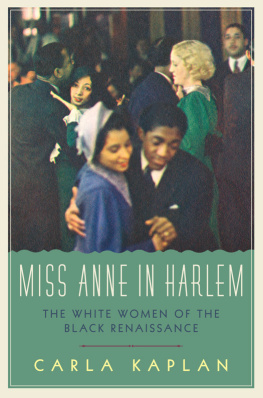The University of Chicago Press, Chicago 60637
The University of Chicago Press, Ltd., London
1987 by The University of Chicago
All rights reserved. Published 1987
Paperback edition 1989
Printed in the United States of America
12 11 10 09 08 07 10 9 8 7
ISBN 978-0-226-15629-3 (e-book)
Library of Congress Cataloging-in-Publication Data
Baker, Houston A.
Modernism and the Harlem renaissance.
Bibliography: p.
Includes index.
1. American literatureAfro-American authorsHistory and criticism. 2. American literature20th centuryHistory and criticism. 3. American literatureNew York (N.Y.)History and criticism. 4. Harlem Renaissance. 5. Modernism (Literature)United States. 6. Afro-Americans in literature. 7. Afro-American artsNew York (N.Y.) I. Title.
PS153.N5B25 1987 810.9896 87-5014
ISBN 0-226-03525-5 (pbk.)

The paper used in this publication meets the minimum requirements of the American National Standard for Information SciencesPermanence of Paper for Printed Library Materials, ANSI Z39.48-1992.
emmusel, hurlant quelle tait gutturale, ta voix, qui parlait dans le silence des ombres.
Aim Csaire
Afrique
Blackface is the easiest make-up in the entire make-up box, and requires little or no experience to do acceptably. While any other character requires a great deal of thought, study and experimental work, the nigger make-up is most elemental, simple in application and anyone using the least care can achieve a satisfactory result, with little or no practice.
Herbert Powell
The Worlds Best Book of Minstrelsy
Maroon men throughout the hemisphere developed extraordinary skills in guerrilla warfare. To the bewilderment of their European enemies, whose rigid and conventional tactics were learned on the open battlefields of Europe, these highly adaptable and mobile warriors took maximum advantage of local environments, striking and withdrawing with great rapidity, making extensive use of ambushes to catch their adversaries in crossfire, fighting only when and where they chose, depending on reliable intelligence networks among nonmaroons (both slave and white settlers), and often communicating by horns.
Richard Price
Maroon Societies
Harlem is vicious
modernism. BangClash.
Vicious the way its made.
Can you stand such Beauty?
So violent and transforming?
Amiri Baraka
Return of the Native
Preface
Two signsmodernism and Harlem Renaissancecoalesce in the following discussion, but not in altogether familiar ways. Traditionally in discussions of Afro-American literature and culture, modernism implies the work of British, Irish, and Anglo-American writers and artists of the early twentieth century. The collaged allusiveness of T. S. Eliots The Waste Land and Joyces Ulysses, the cubist reveries of Picasso, the imagism of Pound, or the subversive politics of surrealistsall have been implicit objects or processes for commentators treating modernism and Afro-American literature and culture. I remember a long conversation with a brilliant young black man that carried us from the steps of Connecticut Hall at Yale, to a local cafeteria, to Sterling Library, and then out into the open air again. He was adamant in his claim that only Melvin Tolson among the vast panoply of Afro-American writers had become a successfully modern writer (before, say, Baldwin or Ellison)by which he meant that only Tolson, in his view, sounded like Eliot, or Joyce, or Pound, or...
Now, I do not want to submit a mere anecdote as evidence that all spokespersons and analysts of Afro-American expressive traditions have shared a single view of modernism. But I do want to insist that the moment of the 1920s known as the Harlem Renaissance has frequently been faulted for its failure to produce vital, original, effective, or modern art in the manner, presumably, of British, Anglo-American, and Irish creative endeavors. To wit, the signal outpouring of black expressive energies during the American 1920s is considered by one of its better-known critics, Nathan Huggins, as provinciala word for which one might substitute, I suppose, old-fashioned, or even moribund. The familiar creators of HarlemCountee Cullen and Claude McKay, Alain Locke and Nella Larsen, Langston Hughes and Jean Toomerdo not, in the opinion of any number of commentators, sound modern.
My following discussion, therefore, will seem, at least, nontraditional. For I disagree entirely with the general problematic I have just suggested, a problematic that judges the Harlem 1920s a failure. In my discussion I offer what is perhaps a sui generis definition of modern Afro-American sound as a function of a specifically Afro-American discursive practice.
I began pondering issues of modernism and Afro-American expressive culture when I was invited to participate in the Cambridge History of American Literature project under the directorship of Sacvan Bercovitch. My interest continued through a National Endowment for the Humanities Summer Seminar for College Teachers and the coordination of a panel for the English Institute during the summer of 1985. My orientationas opposed to my interestwhere these issues are concerned, however, was conditioned by something far more long-standing and perduring than academic engagements.
The orientation of the reflections that follow derives from a family history and, in particular, from reminiscences of the life of my father, Houston A. Baker, Sr., who died in 1983. Reflecting on the labors of generations of black men and women in the United States who have been exploited, segregated, physically and verbally abused, denied access to opportunity, and called all manner of untoward names, and who have, nonetheless, forged a mighty identity and forced the white world to stand in awe and, sometimes, to effect powerful imitations of their signal laborsthinking on such indisputable facts of our family history (and on my father as metonym for that history) I suddenly wondered who, precisely, had consigned the Harlem Renaissance to the domain of failure and how we, as Afro-American scholars (but more importantly as descendants of a resonant black lineage), could tolerate this consignment.
I knew, to be sure, that my father had not been a failure either in my own eyes or in the eyes of the community he served for seventy-five years as a dedicated disciple of the teachings of Booker T. Washington. Though he earned graduate degrees from Northwestern University (in hospital administration) and the Wharton School, University of Pennsylvania (MBA), he was denied even the barest hint of what the white interior of American opportunity might be. He did not go to school, however, to gain access to such interiors, because he knew very well that there was no access. Instead, he went to school to master the forms of standard educational processes in the West in order to mold himself into what he ultimately becameone of the smartest, most effective, and keenly businesslike black administrators in the United States. (Which, as any black professional who has made his or her way to productive competence in a racist United States knows, means: My father was an
 The paper used in this publication meets the minimum requirements of the American National Standard for Information SciencesPermanence of Paper for Printed Library Materials, ANSI Z39.48-1992.
The paper used in this publication meets the minimum requirements of the American National Standard for Information SciencesPermanence of Paper for Printed Library Materials, ANSI Z39.48-1992.

